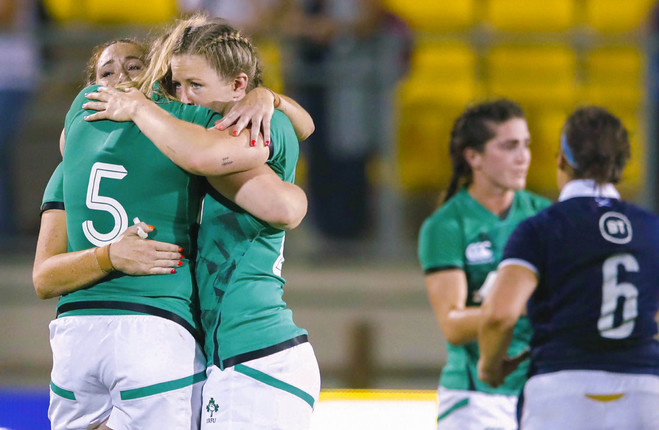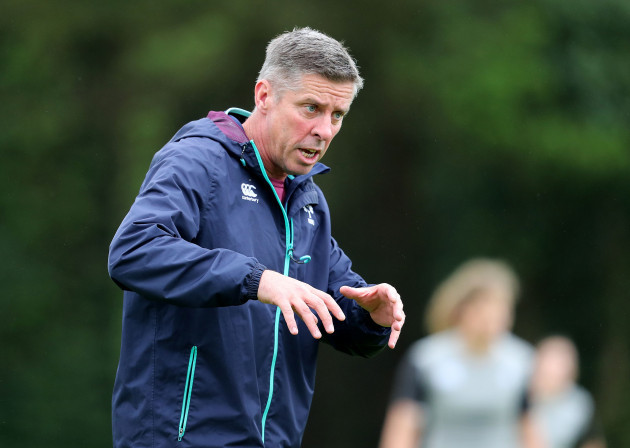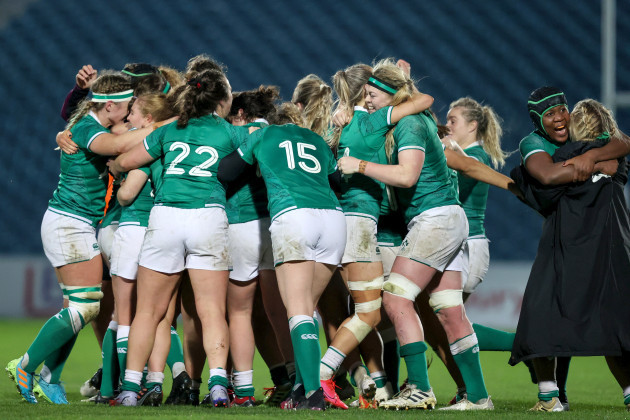THE MOST STRIKING thing about the 30 recommendations to come out of the independent report into Ireland Women’s failure to qualify for the World Cup is how basic they are.
A full-time head coach and full-time assistant coach specifically for the 15s team, expert sports psychology, a full-time athletic performance coach, a full-time analyst, a dedicated nutritionist, and “equitable support” with kit, facilities, equipment, and accommodation.
As you read another recommendation that Ireland should have a squad culture of “consultation and engagement with players,” the point is hammered home.
It all underlines where Ireland are coming from and how much this review was really needed.
It was very telling that IRFU CEO Kevin Potts revealed yesterday how Ireland Women’s players were “uncomfortable” with the recommendation that the union should consider contracts. He indicated that Ireland’s players would have preferred that bit to be left out.
Clearly, they just wanted all the obvious, simple stuff sorted first. Read through the recommendations and it’s like a list of foundational aspects needed in any high-performance programme.
In what is a huge success for the 62 current and former players who spoke out against the IRFU’s ‘untrustworthy leadership’ of women’s rugby as recently as December, the union has vowed to act on all 30 of the recommendations from the independent report.
An additional €1 million of funding for the women’s game each year [taking the total spend to around €4 million annually] will help get these basics in place, while confirmation of a dedicated ‘Head of Women’s Performance & Pathways’ a very encouraging move. It’s a big job for whoever comes into that role.
Previously, Anthony Eddy had been overseeing the men’s 7s programme as well as all of the women’s game.
Eddy’s exit from the IRFU was confirmed on Thursday and Potts insisted that this was not linked to the details of the review we heard about yesterday.
“They’re not linked at all,” said Potts. “Anthony informed the IRFU of his intention to pursue other opportunities as per his statement and we wish him well.”
Potts said that the IRFU is likely to hire someone else to take care of 7s rugby, but he did confirm the appointment of the highly-regarded Gemma Crowley in the role of the Ireland Women 15s team manager. She will ensure the basics are in place and done well.
On top of those assurances, the union has also apologised to Irish women’s rugby players.
Again, this marks a major success for the players who previously said they had lost “all trust and confidence” in the IRFU.
Potts, who took over as the union’s new CEO in January, is understood to have been well received by the players in discussions over recent months and it was he who offered the IRFU’s apologies.
This was in stark contrast to the IRFU’s initial reaction to the players’ letter. That response was an ill-judged statement in which the union expressed its disappointment and said it “refutes the overall tenor of that letter.”
Those words had simply underlined a dismissive attitude towards the players but Potts set an altogether better tone yesterday.
“I guess what I’m sending out to the players and anyone involved in the women’s game is that I apologise for the lack of any confidence, or perceived lack of interest, that the IRFU have had in the women’s game and that going forward if they felt they weren’t being listened to, they are now. I will ensure that continues.”
Yesterday was a much-needed positive for women’s rugby and with a fresh-looking Ireland squad named by new head coach Greg McWilliams for the upcoming Six Nations, there is cause for optimism.
Not that everything is suddenly all rosy.
There are still doubts and concerns. Take, for example, a response rate of 53% from players who were contacted as part of the surveys for the independent World Cup Qualifier review, with just a 31% response rate among staff.
Those are startling numbers given the gravity of this review.
“I wouldn’t read anything into it,” said Potts when asked about the apparent lack of interest from some of those actually on the inside.
The IRFU also clearly hasn’t figured out the dilemma of how players will go from 7s to 15s rugby and back again.
This has been a major sticking point in recent years. Eddy was a huge advocate for 7s rugby and IRFU performance director David Nucifora is also very fond of the seven-player code.
Nucifora wasn’t part of yesterday’s briefing, with Potts saying, “This is so important to the IRFU that I, as CEO, am dealing with this today. David is getting on with the tasks that need to be done.”
One of the recommendations from the review is for “a clear and coherent selection policy that reflects union 15s and 7s priorities. Ensure it is created in consultation with performance staff and players, includes fair and consistent communication of decisions, is monitored for adherence, and is effectively communicated.”
This underlines that there hasn’t been a clear, coherent policy that has been effectively communicated to all parties. It will be interesting to watch how this side of things develops.
“One of the asks of our new Head of Women’s Performance and Pathways will be to examine that whole interaction between our 7s and 15s squads and to make recommendations up through the National Professional Game Board and to the IRFU as to how that will be managed in the future,” said Potts.
“There is certainly a perception there that it needs clarity.”
IRFU Committee member Fiona Steed, who also chairs the Women’s Sub-Committee, chipped in to underline that this is an issue everywhere in women’s rugby.
“It’s not just us,” said Steed in relation to the 7s/15s balance. “Every country is struggling with this.”
So while the IRFU’s acceptance of the 30 recommendations is great, the new hires will be very welcome, and the additional funding is crucial, the hard work is still ahead.
“Look, there may well be a bit of pain,” said Steed. “To be absolutely brutal, the gap is there between England and France and the rest of the world at the moment. They are ahead of us. We need to be top three in the Six Nations. I see that as achievable. I see that as success, whatever position in the top three.
“And then get into the top tier to compete consistently against the best in the world until we become the best in the world.”
Lofty ambitions, certainly, but yesterday was a step in the right direction.
The last word must go to the players. A statement yesterday that was signed by Ciara Griffin, Claire Molloy, Cliodhna Moloney, and Lindsay Peat ended on a note of optimism:
“Together, the changes that emerge as a result of all of this work, alongside renewed commitment in women’s rugby right from the top of the IRFU, means we can look to the future with greater confidence than ever before.”



